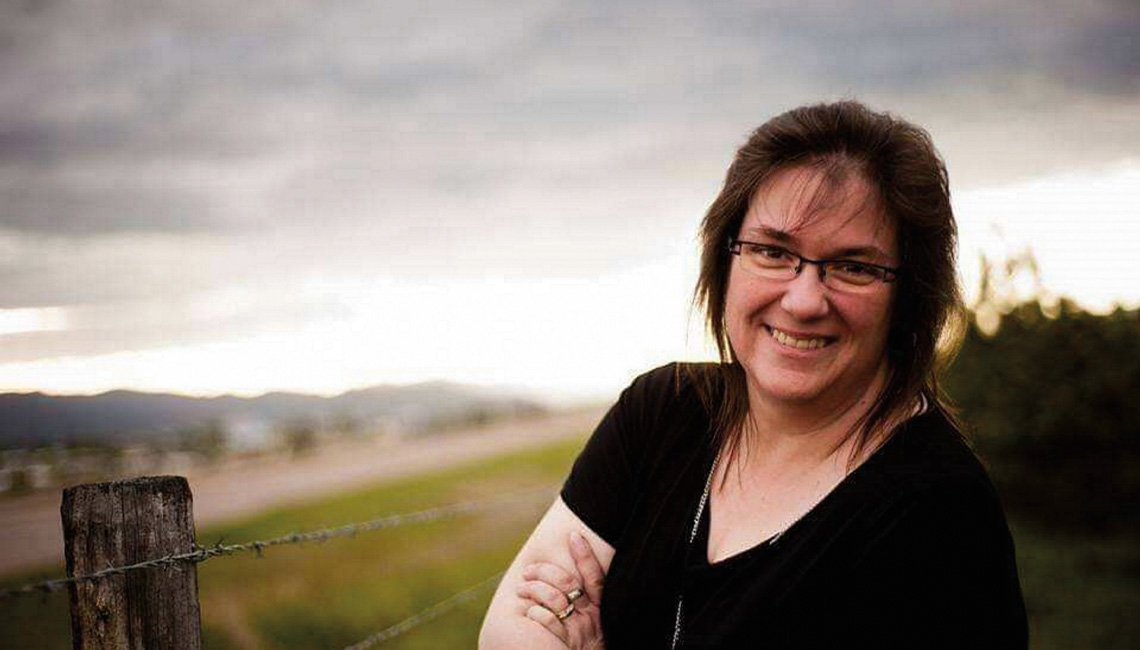When people are dealing with natural disasters, loss of loved ones, addiction, or any of a number of traumatic life events, they often find themselves in need of spiritual guidance.
Enter the International Alliance of Community Chaplains. “We’re trained in chaplaincy, how to do counsel with people in trauma and at critical incidents,” says Tracy Elder, chairman of the board and former president of the group. ”We’re helping people to recover from any type of trauma, no matter what it is.”
Tracy Elder (left) poses with chaplains Debra Homegun (center) and Jenn Buckley and Buckley’s daughter, Hayley, of the Native Nations Chaplaincy Alliance during a recent visit.
Elder lives in Knox County, where she’s a member of The Energy Cooperative of Newark. She leads a worldwide team of nearly 1,000 board-certified volunteer chaplains trained to provide mental, emotional, and spiritual support, counseling, addiction and recovery services, and critical incident support wherever they’re needed. They might once have been victims themselves, or they could be first responders — law enforcement, fire, and emergency services personnel. Chaplains work with community service, courts, schools, hospitals, hospice, and veterans.
The organization started in 2004, after a series of tornadoes moved through South Carolina, leaving devastation behind. “There were all these people standing in front of these broken homes,” Elder says. “It was like a scene out of Twister, the movie.”
That scene was the incentive to form the corps. First, it was a small local group in Seneca County, where Elder worked as chaplain for the Seneca County Sheriff’s Office. But it grew, and now 18 years later, the organization reaches across the United States and to Europe, Africa, Barbados, the Caribbean, and Polynesia — the most recent additions this year in Hawaii and the Samoan Islands.
Even before she formed the organization, Elder was at Ground Zero during 9/11 in New York. Members have been in New Orleans after Hurricane Katrina and at countless similar disasters. “Those are the things where you realize people really need spiritual care, when their whole world has been rocked,” she says.
But natural disasters aren’t the only devastating events in people’s lives. “It can be a divorce, domestic violence, or losing a child or another family member,” she says. “These things happen every single day, and not everyone is equipped to deal with the traumas of life.”
Working with a former student with tribal connections, Elder said the organization has extended its services west.
“Right now, we’re doing a lot of work in Montana with (Native American) tribes,” she says. “I was more surprised than anyone to find they really welcomed us in. We put together a class there, and next thing you know, we have all the tribes in Montana signed on.”
An offshoot of the parent organization, the Alliance represents more than 40 nations, including all the tribes in Montana as well as several in Washington state, Oklahoma, New Mexico, and Arizona.
Elder says the corps is one of the only chaplaincy organizations working with Native American tribes at the tribal council level.
“If you look at the tribal nations, there’s a lot of trauma historically, and right now they’re losing their children to suicide,” Elder says. “They seem to have a disproportionate number of their people suffering from different traumas,” she says. “This gives them something now where they’re able to heal their people.”
No matter their age, gender, or race, chaplains are trained to help people face their addictions and move past trauma to regain their lives. “What we’re teaching them is a new way to communicate, and doesn’t everybody need that?” she says. “We’re having the hard conversations.”
When someone is addicted to a substance, there are physical, mental, and emotional aspects.
“There’s a level of shame that goes in there with the people who are addicted, but they’re not able to communicate well,” she says. “How do you tell someone what you left behind and were willing to do to continue the addiction? Most of them can’t get past the misunderstandings other people have about it.”
Chaplains help people look within themselves.
“The first step is telling God and another person you’re wrong,” she says. “That’s the conversation that has to happen. They must face it within themselves. There’s something in there. It doesn’t have to make sense to anybody else. It makes sense to them.”
It’s a similar process when helping people through domestic violence and relationship issues. ”That’s the first step in getting people to heal, because of the way trauma works on the way we think and the way that we see the world,” she says.
This fall, the organization launched a new program that goes beyond an immediate need for chaplaincy to long-term care.
“We now have board-certified coaching chaplains,” Elder says. “One of the things we find as chaplains is that people are in need not only of spiritual care, but after-care. They’re not sure how to put their lives back together.”
After significant life changes, coaching chaplains help them find a path back to a new life.
“It’s a new normal,” she says. “Life is not the same as it was.”
She says coaches don’t do mental health counseling and diagnosis of mental illness, but help people get moving toward their new lives.
“To go and help. That’s what it’s all about.”











